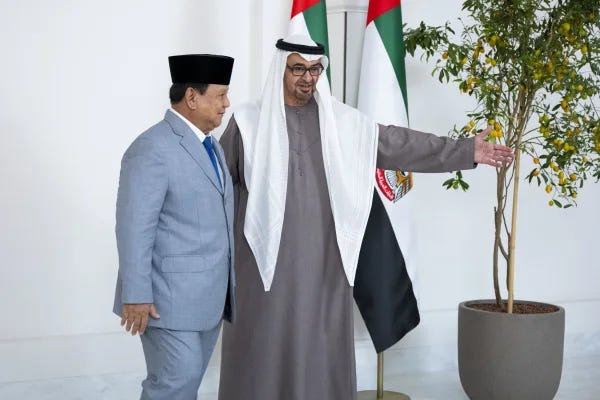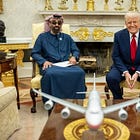Indonesia’s UAE Deals: Towards Abraham Accords?
Economic pressures may be nudging the traditionally pro-Palestinian nation towards frameworks like the Abraham Accords and normalisation with Israel.
On April 9, 2025, Indonesian President Prabowo Subianto launched his Middle East tour in Abu Dhabi, culminating in the signing of eight bilateral agreements with the United Arab Emirates, four of which were government-to-government pacts. These agreements, spanning agriculture, environment, culture, and security, reflect a diversified approach to deepening ties. Slowing economic growth appears to be the catalyst for this leap in Emirati-Indonesian relations, which may signal Indonesia’s first steps towards alignment with the United States and potential inclusion in the Abraham Accords, marking a departure from Jakarta’s tradition of non-alignment.
Ambitious Goals Amid Economic Strain
Indonesia, already the largest economy in Southeast Asia, aspires to achieve high-income status by 2045, with forecasts suggesting it will be the world's seventh-largest economy by 2030. Eyeing membership in the Organisation for Economic Co-operation and Development (OECD) to complement its BRICS affiliation necessitates a delicate balancing act between ties with Beijing and Washington. Amid these aspirations, the nation faces significant economic challenges: a shrinking middle class (from 60 million in 2019 to 48 million in 2024), with the Rupiah hitting a record low earlier last month, and US tariffs threatening to exacerbate this economic slowdown.
Strengthening relations with Abu Dhabi—and other Israel-normalising countries included in the tour—represents a strategic pivot towards a more US-aligned, economically integrated future. The robust Emirati-Indonesian relationship, built on decades of religious and economic cooperation, provides a strong foundation. Notably, Indonesia was the third country to sign a Comprehensive Economic Partnership Agreement (CEPA) with the UAE, underscoring the depth of their economic ties.
Prabowo’s visit saw the signing of eight cooperation agreements, four of which were government-to-government memoranda of understanding (MoUs) on counterterrorism, agriculture, defence, and religious affairs. Another was an energy pact between Indonesia’s PT PLN and Abu Dhabi-based Masdar to develop the Jatigede Floating Solar Power Plant in Indonesia.
Sidelining the Palestinian Cause?
Historically a staunch supporter of the Palestinian cause, Indonesia may be reconsidering its position. Over the past decades, sporadic reports—primarily from Israeli media—have hinted at discreet talks between Indonesian leaders and Israel, though Jakarta has consistently denied these claims. However, the recent push to strengthen ties with the UAE and other Gulf states that have normalised relations with Israel lends credence to these reports. Moreover, Indonesia’s recent high-level engagements with the UAE and Jordan, including the signing of a new counterterrorism MoU with the UAE, reflect Jakarta’s deepening alignment with their security priorities. These ties, alongside Jordan’s ban on the Muslim Brotherhood signal Indonesia’s tacit support for efforts to curb the Brotherhood’s influence. By strengthening partnerships with Abu Dhabi and Amman, both of which have cracked down on the Brotherhood, Jakarta may further distance itself from pro-Palestinian resistance movements linked to the group, potentially paving the way for Indonesia’s inclusion in the Abraham Accords. The domestic economic pressures outlined earlier may be nudging the traditionally pro-Palestinian nation towards frameworks like the Abraham Accords, potentially laying the groundwork for normalisation with Israel.
The New Indonesian International Relations
Indonesia’s recent diplomatic manoeuvres, particularly under President Prabowo Subianto, mark a subtle but significant recalibration of its foreign policy posture. The deepening of ties with the United Arab Emirates and other Gulf nations that have normalised relations with Israel indicates a strategic pivot driven less by ideological alignment and more by economic pragmatism and geopolitical opportunity. Faced with slowing economic growth, a weakening currency, and the ambition to ascend to OECD and high-income status, Indonesia is increasingly prioritising global integration and strategic diversification over rigid adherence to its historical non-alignment stance.
Looking ahead, Indonesia is likely to continue expanding its engagement with countries aligned with the Abraham Accords, using its partnerships with the UAE and Jordan as diplomatic gateways. While formal normalisation with Israel may not be imminent due to domestic political sensitivities and strong public support for the Palestinian cause, Jakarta may incrementally deepen unofficial ties through economic, technological, and security cooperation.
If the trend continues—especially under pressure to secure OECD membership and bolster ties with Washington—Indonesia could emerge as the first Southeast Asian country to formally or tacitly participate in the Abraham Accords framework. Such a move would not only reshape its regional identity but also signal a major shift in the geopolitical architecture of the Muslim world, highlighting the growing influence of economic imperatives over ideological loyalties in shaping 21st-century diplomacy.




